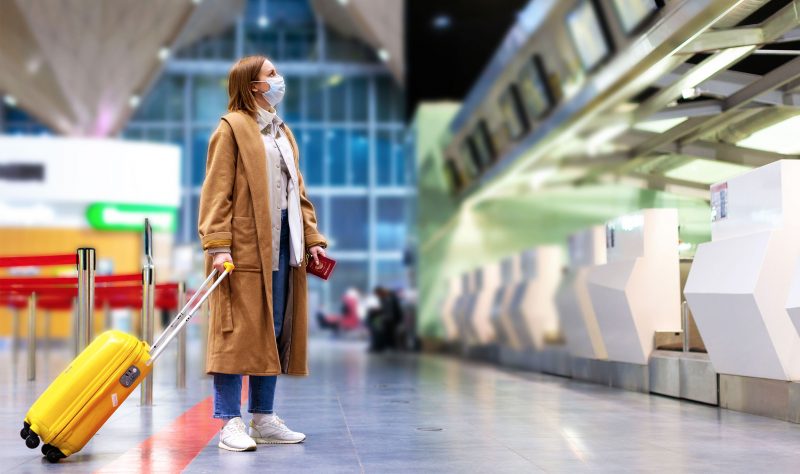Higher demand for remote destinations
According to data from Amadeus this year we can expect rising demand for trips to far-away countries. The number of requests for destinations such as Tanzania, Peru and Jordan has already increased materially compared with 2019. This is most probably because the long-lasting restrictions have prompted the public to plan holidays to places they always wanted to visit but kept putting off. This is confirmed by Destination Analytics as well — in the last year the public has been much more enthusiastic about considering new destinations and travel formats. Indeed, among remote destinations on RateHawk we have noted particular interest in the Emirates, the USA, Dominican Republic, Mexico, the Maldives, Egypt and Thailand.
We will most probably see increased demand for long-distance holidays and exotic destinations in 2022.

Among remote destinations on RateHawk we have noted particular interest in the Emirates, the USA, Dominican Republic, Mexico, the Maldives, Egypt and Thailand. Photo: Belikova Oksana / Shutterstock.com
Reduced number of short trips
Travelers will most probably prefer to increase the duration of their trips in 2022. Latent demand for travel and the unpredictability of possible restrictions being imposed on entry to various countries will have an impact on the duration of journeys. In such circumstances it’s logical that many people will want to combine two short trips into one long trip. This will help to reduce costs and minimize efforts spent on planning the trip.
32% of foreign trips on RateHawk in 2021 were booked for a length of 7-15 days. Demand for long bookings (of two weeks or more) were noted in research by HRS Longstay.

Travelers will most probably prefer to increase the duration of their trips in 2022. Photo: ASTA Concept / Shutterstock.com
Increased number of “digital nomads”
If, previously, digital nomads (people whose work doesn’t keep them tied to an office and combine their work with traveling) were quite rare, then today they are truly a reality. Many employers and some major international corporations have even decided to abolish the requirement to spend time in their offices. And that means that the number of people ready to combine work and traveling will only increase. The workation (work+vacation) trend started to gain popularity even before the pandemic. But the widespread transfer of staff to working remotely has made workation something perfectly ordinary. Today there is every sign that the number of digital nomads will only grow.
At the same time, not everybody is willing to combine work with vacation. Some people continue to prefer drawing a clear line between working and traveling. Specifically, 62% of respondents stated that they would not spend any time on work matters during their holiday, and that they would try to restore their work-life balance.

If, previously, digital nomads were quite rare, then today they are truly a reality. Photo: Asmiana / Shutterstock.com
Increasing demand for large group bookings and the return of hostels
Amadeus’s research shows that during the pandemic demand grew for friendcation (friends+vacation). Such a holiday involves destinations or locations to which it’s convenient for a large group of friends or family to travel. In particular, in Britain the number of bookings for groups of 20 or more people grew by 600% after some of the Covid restrictions were lifted.
Even in 2021 requests for large group vacation bookings increased compared with the previous year. Popular search requests included destinations such as Las Vegas, Mexico and Colombia, while in Europe resorts in Ibiza and Barcelona were especially sought.
And wherever you find friends you will find hostels. The need for socializing and holidaying with friends is reflected in where travelers want to stay. According to surveys by G Adventures, 63% of respondents aged from 18 to 34 stated that they don’t mind at all staying in a hostel. The main factor arguing in favor of a hostel is socializing with new people.
Booking several rooms at once
Don’t forget that on RateHawk you may choose up to nine rooms in a single booking.
Increasing role of technology in travels
During the pandemic, the number of views of TV, streaming services and YouTube all increased. And this impacted our travel preferences. Netflix and UNWTO (the World Tourism Organization) analyzed at the end of last year the role of films and serials in driving tourism. The report provides the example that in 2020 the village of Porthgwarra in England was visited by 50% more tourists thanks to the success of the TV show Poldark.
Technology not only impacts our choice of destinations, but also helps to plan journeys. For example, creators of the virtual assistant Alexa have added a function to the smart speaker that will suggest an idea of visiting the locations where the movie you have just watched was filmed. It is becoming much faster and easier to plan and select destinations for journeys with new technology. The role of technology as a tourism driver will most probably only grow.

In 2020 the village of Porthgwarra in England was visited by 50% more tourists thanks to the success of the TV show Poldark. Photo: Helen Hotson / Shutterstock.com
Lower demand for holidays near home and an increase in international bookings
Whereas before the pandemic some people preferred to spend their vacation at home or chose short day trips nearby, the pandemic has changed this trend. G Adventures has identified that only 18% of respondents preferred holidays at home or a day trip and didn’t want to travel abroad. By contrast, 30% strongly agreed that they are no longer willing to go on holiday in their home country.
This is also confirmed by HomeToGo data — in the last few months, searches to book accommodation abroad have increased by 88% compared with 2020. The total number of requests for foreign bookings has returned to the 2019 level.

30% of respondents are no longer willing to go on holiday in their home country. Photo: DimaBerlin / Shutterstock.com
Increased number of bookings with an outbound flight just one week later
In the last two years, the public’s attitude towards planning journeys has changed. Travelers have changed their approach to arranging trips and have in many ways become flexible and impulsive. To a large extent this is the influence of the pandemic — entry rules and quarantine conditions change literally on a daily basis. According to Kayak requests to book tickets with an outbound flight just one week later have increased by 50%.
Two years of the pandemic have changed our view of traveling. Both traveling conditions and the approach of the public to planning journeys have changed, but people’s desire to travel remains unchanged and they will continue to travel, so it is our job to ensure they enjoy the most comfortable and safest holiday possible.


